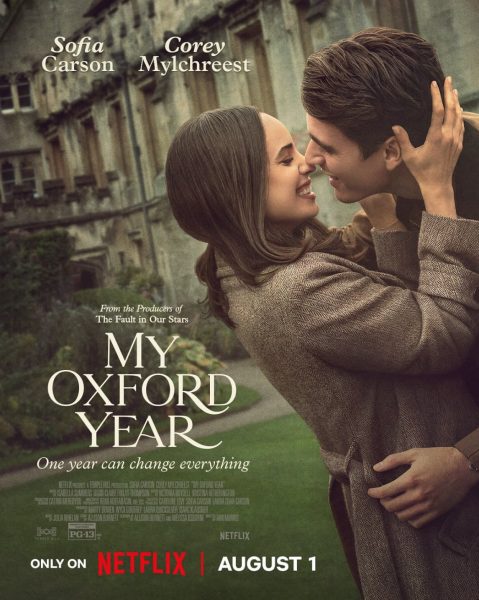Tell Me This Show Will Get Better: A “Tell Me Lies” Review
Emma Robert’s directorial debut, “Tell Me Lies,” is based on Cara Lovering’s novel of the same title. (Courtesy of Instagram)
When the first three episodes of “Tell Me Lies” dropped on Hulu on Sept. 7, the Internet erupted in chatter. Many sympathized with the experience of becoming entangled in a toxic relationship and praised the show for not glorifying such an experience. Others were more enthralled by the dramatics the series purveys through the sprinkling of soapy storylines into a relatively realistic portrayal of college life. No matter the reaction, “Tell Me Lies” is undoubtedly a hot topic in streaming television and on social media.
“Tell Me Lies,” based on the 2018 novel by Carola Lovering, revolves around the turbulent relationship between Lucy Albright (Grace Van Patten) and Stephen DeMarco (Jackson White), following the two over an eight year period. The series opens in 2015 with Lucy – now in a significantly healthier relationship – attending the wedding of college friend Bree (Catherine Missal) and mentally preparing herself to interact with Stephen after their messy breakup four years prior, which Bree and Lucy’s friend Pippa (Sonia Mena) will not let Lucy forget (despite her concerted efforts to).
After this brief introduction, we are whisked away to 2007, where we are enmeshed in the college years of Lucy and Stephen’s relationship. We remain there for the next four episodes. Lucy and Stephen’s relationship is marred from the beginning: Lucy struggles with her insecurities and the recent death of her roommate while Stephen remains unwilling to let go of his ex-girlfriend Diana (Alicia Crowder), creating a frustrating love triangle that will undoubtedly plague the rest of the season. Promising to be a psychological drama, “Tell Me Lies” ends up being a rather bland melodrama.
Despite almost half of the season being released by Hulu, “Tell Me Lies” has communicated very little in the way of its characters and plot. The series has mostly taken place in a flashback to the early years of Lucy and Stephen’s relationship with only fleeting glances at the future. This would not be an issue if the pacing were well done, except by the fourth episode we are still in the first couple months of Lucy and Stephen’s relationship.
While it is yet to be confirmed as to whether “Tell Me Lies” is renewed for a second season, with the pacing this poor, it begs the question as to how Lucy and Stephen’s relationship will play out over the next eight years and over the course of the series. If series creator Meaghan Oppenheimer were to play the long game with Lucy and Stephen and keep audiences invested, that would be doable. However, Lucy and Stephen are generally uninteresting to watch. The acting chops of Van Patten and White are not in question, as the two actors are quite adept in their respective roles; rather, their characterizations by the writers are weak and surface level. Lucy and Stephen’s relationship is toxic because it is intended to be all-consuming for them, those around them and the audience. As a viewer I felt like I wanted no part in their relationship, and not in the way the writers intended: I was simply not drawn in.
What “Tell Me Lies” does right, however, is its refusal to romanticize toxic relationships, as so often happens in many forms of media. At its core, “Tell Me Lies” is a reflection on how toxic relationships can perpetually ruin lives even after the relationship ends. They are not simply learning moments to prepare yourself for “the one,” they can be detrimental to the self and destructive to others in the vicinity. Stephen’s perniciousness is disguised as charm, which is what draws Lucy to him in the first place and keeps her with him. She tolerates his lies for his affection and her comfortability during the relationship, but these lies stay with her well into her future. Even though narratively as a couple they remain difficult to become engaged in, the show has done its job in making their relationship difficult to watch. Lucy and Stephen paint a painfully accurate picture of a toxic relationship that the show thankfully does not idolize.
For future episodes, I am hoping for more of a focus on Lucy and her desires rather than scenes of Stephen and Diana, who also deserves better than being pitted against Lucy. However, I am doubtful that this wish will be fulfilled, as the preview for the fifth episode proves to be unpromising. Though “Tell Me Lies” trudges at a slow pace, it does break from the tired and harmful trope in media of romanticizing toxicity in relationships. This fact gives me hope for the series.
















































































































































































































Allison • Oct 1, 2022 at 7:58 pm
I turned this on and immediately got Fordham vibes from 20yrs ago … hopefully the vibe there has changed on campus these days lol